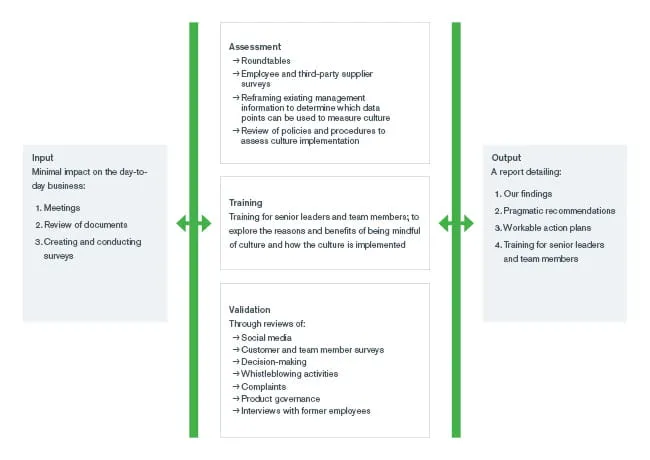Since 2008, the corporate world has been beset with scandals which within these organizations provide insightful case studies from which all organizations, regardless of industry, can learn.
The one common denominator amongst failing firms was the failure to establish and monitor a positive organizational culture, underpinning individual behaviors and the treatment of customers. These cultural shortcomings are often visible through one or more of the following symptoms:
- Governance that did not align with the complexity of the business models
- Poor controls and risk management arrangements
- Inadequate scenario and resilience testing
- Inadequate oversight and challenge of decision-making
- Use of incomprehensible/complex language and management information and/or data
- Rapid expansion beyond the capabilities of operational infrastructure
- Unchecked incentives for individuals
Regardless of industry sector and market dynamics, an unhealthy culture can result in a breakdown of governance, controls and ultimately lead to poor decision-making. This could have significant negative consequences for an organization.
Has lockdown given you the opportunity to reflect on the culture prevalent in your firm?
What Is Meant by the Term Culture?
As Ralph Waldo Emerson stated, “Culture is one thing and varnish is another.”
Emerson led the transcendentalist movement in the late 19th century, and the core belief was in the inherent goodness of people and the belief that this goodness has been corrupted by society and institutions. People want to do the right thing, but can organizations truly say their culture and ways of working allow the right thing to be done? The quote above by Emerson sums up the need to look at culture in today’s business world. Is the corporate culture truly the DNA of a business or is it a varnish manifested in terms of mission statements, organizational values and pledges of good customer service?
The term culture has many academic definitions, but it can be summarized as the shared values and beliefs of a group of individuals. In all industry sectors, organizations should seek to develop a common culture for their employees and partners to support a common understanding of their purpose and values.
Culture shapes decision-making and response to a crisis and is prevalent in all activities of the organization and its teams. The benefits of a culture which encompasses openness, transparency, honesty and fairness are numerous. These aspects of good business practice can drive organizations forward in meeting the challenges and seeking opportunities from the fast pace of change and innovation in our world. A healthy commercial culture needs to be driven from the top, which is then integrated into everyday operations and decision-making.
Why Should We Be Interested in Culture?
Recent failures in the business world can ultimately be linked to a failure or disconnect of the culture within organizations. For this reason, it is imperative that all organizations, no matter the industry, review and monitor their culture. This assessment not only helps to inform the organization of the internal environment but also enables the organization to develop and refine its outward perception within the business world.
What Should Organizations Do?
Organizations should take a proactive approach and should seek to engage in cultural assessment with an open mind. Governments and regulators alike are increasingly focused on the cultures prevalent within organizations.
Culture cannot be assessed or molded overnight—rather, it requires a commitment over a period of time to ensure it is working, sustainable and is supporting positive behaviors within an organization. Further, a positive culture is driven by the environment (external and internal), actions, mindsets and a common set of beliefs. These aspects are to be considered within the organization’s core values, strategies and objectives.
What Can Kroll Offer?
Kroll has expertise in the assessment of and implementation of measures to assess and drive culture. We use an organization’s existing frameworks, processes and management information as the starting point to drive forward an ongoing assessment of the culture. We can also work with you to deliver existing remediation plans and/or assess the impact of the changes. We have experience of working with all shapes and sizes of organizations, from single location entities to large multinationals. When working across geographic territories, our work is mindful of local customs and traditions.


